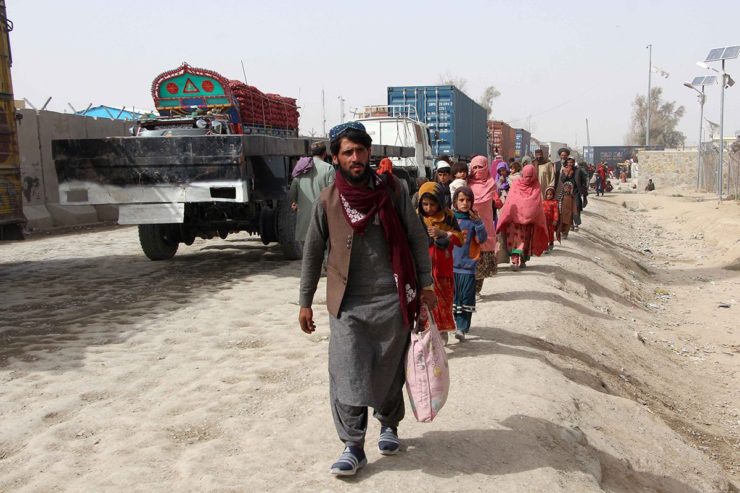
Recently, the Pakistan government ordered non-registered migrants and refugees to leave the country voluntarily before 1st November. After the deadline, the Law Enforcement Agencies are forcefully expelling the illegal migrants from Pakistan. Afghani refugees are the most affected by this move, as Pakistan is home to almost 1.7 million Afghan refugees. Government officials hold that this policy will be executed in phases. Many analysts inside and outside the country are opposing this move by the government, considering it a violation of International Law. However, most of the native population of Pakistan has welcomed this decision, while few have staged protests against the expulsion of Afghanis.
Afghan migrants living in Pakistan have seen such coerced repatriations in the past, but the recent scale of expulsion and deportation is unprecedented. Officials in Pakistan hold that this decision is made in the broader interest of the public, and to make Pakistan safe and prosperous. However, the domestic politics and the increasing tensions between Pakistan and Taliban-led Afghanistan are likely to be the key factors that drove this decision by the former.
Some of the key factors behind the Pakistan-Afghanistan tensions include the Durand Line issue and the use of Afghan soil by Tehreek E Taliban Pakistan and other such terrorist organizations to conduct terrorist activities in Pakistan. The Durand line was demarcated in 1893 when Abdur Rehman, the then Amir of Afghanistan, and Mortimer Durand, the British Foreign Secretary, inked an agreement. This pact demarcated some of the Pashtun-inhabited areas to the British Empire. However, after the end of the British rule from the subcontinent and the independence of India and Pakistan. Afghanistan made an irredentist claim on Pashtun areas of Pakistan, claiming that these areas belong to it and the Durand line agreement is void with the end of the British rule in the Subcontinent. Both countries have been at daggers drawn over these areas. However, during the War on Terror, this issue did not take much attention. But the rise of the Taliban government in Afghanistan has once again brought this issue to the limelight.
Furthermore, Pakistan has always raised concerns about the use of Afghan soil by different terrorist organizations to conduct terrorism in the former. The rise of the Taliban government has provided a haven to Tehreek e Taliban Pakistan (TTP), Baloch Liberation Army, and other such terrorist organizations. These organizations use Afghan soil to conduct terrorism in Pakistan. Many Pakistani officials have often claimed that Afghanistan is a haven for TTP. In January 2023, TTP, operating from Afghanistan, conducted terrorist attacks on police headquarters in Peshawar. As per Pakistani officials, Afghans were involved in 14 out of 24 suicide attacks in Pakistan in 2023. More than 60 Pakistani citizens have been killed in recent attacks by TTP in Hangu and Mastung cities in Pakistan recently. Many other such events have also been reported by Pakistani authorities.
Afghan refugees have been involved in many other crimes in Pakistan. In the past, Police officials from the Khyber Pakhtunkhwa province of Pakistan, which borders Afghanistan, held the Afghan refugees responsible for surging criminal activities in almost 25 cities of the province. They restricted the movement of non-registered migrants beyond certain areas to prevent crime in the province. Notably, Afghans had been involved in 45 percent of criminal activities in Peshawar in the past. More than 300 attacks have been conducted by TTP in Khyber Pakhtunkhwa only this year. Moreover, it is said by the officials that many Afghan refugees slip away to their native country after committing serious crimes in Pakistan.
Pakistani authorities have also claimed that Afghan migrants have brought Kalashnikov culture to the country, which resulted in augmenting extremism. Moreover, they have also accused Afghan migrants of drug trafficking and smuggling in Pakistan. Reports show that almost 5 million USD per day are being smuggled from Pakistan to Afghanistan, which gives a strong blow to the already stagnant Pakistani economy. Pakistan’s porous border with Afghanistan and its difficult terrain have made it an onerous task for Law Enforcement Agencies to stop this smuggling.
All these reasons along with many others have been the reasons for Pakistan’s decision to expel almost 1.7 million Afghan refugees. Almost 170000 Afghan refugees have already fled the country voluntarily. Meanwhile, the government of Pakistan has announced a severe crackdown on the illegal Afghan refugees residing in the country. On the other hand, the Afghan government has declared this move unacceptable and has urged the country to revisit its decision. The United Nations has accused Pakistan of severe violation of human rights in the wake of this decision. Similarly, the Western countries are also urging Pakistan to revisit this decision. However, the Prime Minister of Pakistan has made it clear that all the illegal refugees will be deported. He also stated that the country has hosted more than 4 million refugees under the Geneva Convention for the past 4 decades, despite not being a signatory of that convention. Indeed, it will not be easy for the Afghan refugees to go back to their native country and reestablish themselves, especially under the Taliban regime. However, the Pakistani authorities are committed to expelling all the illegal refugees to make their country prosperous and reduce the economic burden caused by them.
Abbas Hashemite – is a political observer and research analyst for regional and global geopolitical issues. He is currently working as an independent researcher and journalist, exclusively for “New Eastern Outlook”.